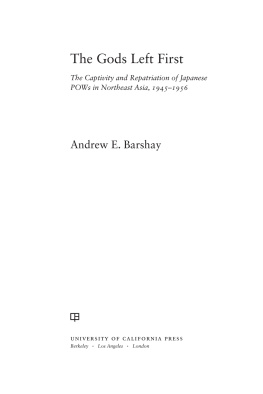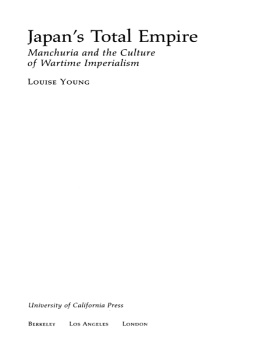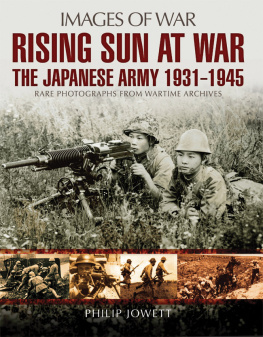
The Gods Left First
The Gods Left First
The Captivity and Repatriation of Japanese
POWs in Northeast Asia, 19451956
Andrew E. Barshay

UNIVERSITY OF CALIFORNIA PRESS
BerkeleyLos AngelesLondon
University of California Press, one of the most distinguished university presses in the United States, enriches lives around the world by advancing scholarship in the humanities, social sciences, and natural sciences. Its activities are supported by the UC Press Foundation and by philanthropic contributions from individuals and institutions. For more information, visit www.ucpress.edu.
University of California Press
Berkeley and Los Angeles, California
University of California Press, Ltd.
London, England
2013 by The Regents of the University of California
An earlier version of Chapter 3 appeared as The Painted Gulag: Kazuki Yasuo and The Siberia within Me , in Representations 119 (Summer 2012): 6091. Used with permission.
An earlier version of Chapter 4 appeared as Knowledge Painfully Acquired: The Gulag Memoirs of a Japanese Humanist, 194549, Journal of Japanese Studies 36, no. 2 (Summer 2010): 25588. Used with permission.
Library of Congress Cataloging-in-Publication Data
Barshay, Andrew E.
The gods left first : the captivity and repatriation of Japanese POWs in northeast Asia, 194556 / Andrew E. Barshay.
pages cm.
Includes bibliographical references and index.
ISBN 978-0-520-27615-4 (alk. paper)
eISBN 9780520956575
1. JapaneseRussia (Federation)SiberiaHistory20th century. 2. Concentration campsRussia (Federation)SiberiaHistory20th century. 3. JapaneseRussia (Federation)SiberiaBiography. 4. Concentration camp inmatesRussia (Federation)SiberiaBiography. 5. JapaneseEast AsiaHistory20th century. 6. RepatriationJapanHistory20th century. 7. ImperialismSocial aspectsEast AsiaHistory20th century. 8. Manchuria (China)Emigration and immigrationHistory20th century. 9. KoreaEmigration and immigrationHistory20th century. 10. JapanEmigration and immigrationHistory20th century. I. Title.
DK759.J37B27 2013
940.531450952dc23
2013008849
Manufactured in the United States of America
22 21 20 19 18 17 16 15 14 13
10 9 8 7 6 5 4 3 2 1
In keeping with a commitment to support environmentally responsible and sustainable printing practices, UC Press has printed this book on Rolland Enviro100, a 100% post-consumer fiber paper that is FSC certified, deinked, processed chlorine-free, and manufactured with renewable biogas energy. It is acid-free and EcoLogo certified.
Contents
Maps and Illustrations
I. MAPS
II. ILLUSTRATIONS
Acknowledgments
I began work on this book in 2002, when I was fortunate to receive a UC Presidents Fellowship for Research in the Humanities to launch the project. Over the decade since then, the Department of History and Center for Japanese Studies at Berkeley have been generous in providing support, which I acknowledge here with much gratitude.
Colleagues and friends close to home and in Japan have been of great help over the years. Randolph Starn, Yuri Slezkine, and Irwin Scheiner took the whole manuscript in hand at different times. I have learned much from their comments and am heartened by their encouragement. The anonymous readers for the University of California Press also offered pertinent suggestions, many of which I have gratefully followed. Choosing occasionally not to do so has at least given me the courage of my narrative convictions. I am grateful as well to Reed Malcolm and Stacy Eisenstark at UC Press for seeing the book through to publication; to Michael Bohrer-Clancy and John Raymond for their fine editorial work; to Ben Pease for creating the maps; and to Thomas Dewald of Art Seed (Tokyo) for help with art permissions.
For the opportunity to present portions of the manuscript in congenial settings across the United States, I am grateful to Kren Wigen, James Bartholomew, Donald McCallum, Gyan Prakash, and again to Yuri Slezkine. Gregory Levine, Thomas Laqueur, Alan Tansman, Mariko Tamanoi, James Vernon, and Stephen Kotkin each kindly read and commented on early chapter drafts. In Japan, Yasui Yichir, formerly vice-director of the Yamaguchi Prefectural Museum of Art, has been surpassingly generous with his time, expertise, and practical assistance. I could not have written the chapter of this book on Kazuki Yasuo without him. Tomita Takeshi, who has taken the lead in organizing the scholarly study of the Siberian internment in Japan, has been a welcoming guide to the work of Japanese and Russian scholars. Oshima Mario, Kojima Shichi, Shimizu Yasuhisa, Got Yasuo, and Got Nobuyo, cumulatively friends of many years, have made it possible for me to appreciate how the past and present are connected in Japan.
It is a special pleasure to thank a number of individuals who have provided me a direct link with the internment experience. Kazuki Fumiko, the widow of Kazuki Yasuo and author of a work on their life together, graciously gave me permission to reproduce the paintings from his Siberia Series used in this book. Fujita Isamu, whom I was fortunate to meet at an early stage, was an internee and participant in the democratic movement in the Siberian camps, and was kind enough to critique my treatment of Takasugi Ichir. Alongside his scholarly career as a sociologist of law, Fujita was among a group of camp veterans, led by the late Takahashi Daiz, who labored for two decades to compile an invaluable collection of hundreds of internee reminiscences and accompanying studies of the camp system. Finally, I am grateful to Iwao Peter Sano, whom I first met in Palo Alto. Born in Brawley, California, Peter Sano was sent to Japan as a teenager to be the adopted heir of a maternal uncle, only to be swept up by the military draft, sent to Manchuria with the Kwantung Army, and interned in Siberia. His memoir, 1,000 Days in Siberia (University of Nebraska Press, 1997), was among the first accounts I read. It has a permanent place in my own memory for its remarkable serenity and clear-sightedness. Having him read my attempts to write about an experience he knew at firsthand has been an honor, as it was to have him speak to my undergraduate class about his life.
I close with thanks to Kimiko Nishimura, who not only brought her critics sense to bear on every line, through draft after draft, but was able to see the way forward when, more than once, I had reached a narrative impasse. I know I tried her patience. But once in, she was all in: she understood, as I hope I did, that the subject demanded nothing less. All in all, I have learned more about writing, and about the importance of good advice, from this project than anything else I have worked on. Yet, ten years on and ten years older, I feel as if I am just now beginning to understand the story I try to tell in these pages.
Note on Names and Terms
With the appearance of Aleksandr Solzhenitsyns The Gulag Archipelago (1973), the term gulag entered the vocabulary of the Western public. It has come to stand for the entire system of labor camps and prisons that operated in the former Soviet Union for much of its history, if not for the Soviet Union itself. Literally, gulag is an acronym for Chief Administration for Corrective Labor Camps and Colonies ( G lavnoe U pravlenie Ispravitelno-Trudovykh Lag erei i Kolonii, hence GULag).
In this book I refer to Japanese prisoners as having been in the gulag. Strictly speaking, they were not, at least not initially. As prisoners of war, captured Japanese were placed in a variety of camps run by the so-called Chief Administration for POW and Internee Affairs ( G lavnoe U pravelenie p o Delam V oennoplennykh i I nternirovannykh, or GUpVI), which, like the GULag, was under the jurisdiction of the Soviet Ministry of Internal Affairs (MVD). GUpVIs major function, as its name suggests, was the organization of foreign forced labor in the Soviet Union.
Next page






